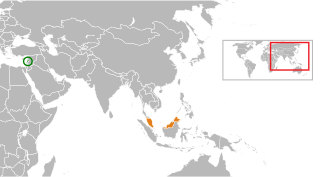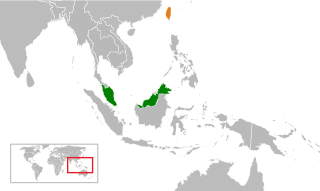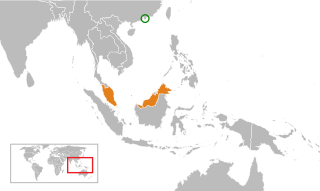 | |
Austria | Malaysia |
|---|---|
Bilateral foreign relations exist between Austria and Malaysia. Austria has an embassy in Kuala Lumpur, [1] and Malaysia has an embassy in Vienna. [2]
 | |
Austria | Malaysia |
|---|---|
Bilateral foreign relations exist between Austria and Malaysia. Austria has an embassy in Kuala Lumpur, [1] and Malaysia has an embassy in Vienna. [2]
History of relations between the two countries can be traced back in 1866 during the Austrian Empire period when the Emperor of Franz Joseph approved the opening of an imperial-royal Honorary Consulate in Penang. [3] However, when the Great Britain declared a war against the Austro-Hungarian Empire in August 1914, the Austrian Consulate was closed down and the last Austrian consul in Penang was detained and deported to Australia by the British administration. [3]
Another related history is located on the island of Borneo when the Austrian-German Consul in Hong Kong named Baron von Overbeck received a parcel of territory in the western coast of northern Borneo after being promoted by an American merchant named Joseph William Torrey in Hong Kong. von Overbeck then depart to Brunei to renewed the concession from the Temenggong of Brunei, [4] and a similar treaty from the Sultanate of Sulu on 22 January 1878. [5] To finance his plans for the territory, von Overbeck got financial backing from the Dent brothers (Alfred and Edward). However, after a high effort to promote the territory to the Austrian and German governments, he was unable to get any attention from the two to conquer the territory. Overbeck later withdrew in 1879, leaving it to Alfred Dent to manage the territory.
The Austrian make a first formal diplomatic relations on 6 August 1962. In 1967, Austria established its Honorary Consulate in Kuala Lumpur and between 1973 and 1974, both the Austrian Embassy in Kuala Lumpur and Malaysian Embassy in Vienna were opened. [3] [6]
In 2005, Malaysia and Singapore were the main trade partner for Austria, with Malaysia becoming Austria's most important partner in Southeast Asia. [7] Austria's main investment in Malaysia lies mostly in the energy and natural resources sectors. [7] In 2009, the financial crisis had an impact to the trade relations with a decrease by 30% but later improved after the visit of the Austrian President Heinz Fischer in 2011. [3] Since 1976, several agreements have been signed between the two countries. [8]

Malaysia is an active member of various international organisations, including the Commonwealth of Nations, the United Nations, the Organisation of Islamic Cooperation, and the Non-Aligned Movement. It has also in recent times been an active proponent of regional co-operation.

Though the Ministry of Foreign Affairs (MOFA) is the government agency which is responsible for conducting the foreign relations of Nepal, historically, it is the Office of the Prime Minister (PMO) which has exercised the authority to formulate the country's foreign policies. As a landlocked country wedged between two larger and far stronger powers, Nepal has tried to maintain good relations with both of its neighbors, People's Republic of China and Republic of India. However, the relationship between Nepal and India was significantly hampered by the 2015 Nepal blockade when the Government of Nepal accused India of mimicking "Russia-Ukraine" tactics by using ethnically Indian residents of Nepal to cause unrest along Nepal's southern border. India denied the allegation and said the unrest were an internal affair. For the most part though, Nepal has traditionally maintained a non-aligned policy and enjoys friendly relations with its neighboring countries and almost all the major countries of the world.
The Philippines has claims on territories which include the Spratly Islands, portions of North Borneo, and the Scarborough Shoal.

Bilateral ties between Malaysia and the United States were established upon Malayan independence in 1957. The US was, and still is one of the largest trading partners for Malaysia and is traditionally considered to be Malaysia's oldest and closest ally in military, economic and education sectors. Malaya was the predecessor state to Malaysia, a larger federation formed through the merger of Malaya, North Borneo, Sarawak and Singapore in 1963. Immediately before the merger, the latter three territories were previously part of the British Empire. But the US has had consular and commercial presence in Malaya since the 1800s. US merchants, especially Joseph William Torrey together with Thomas Bradley Harris also had commercial interests in north western coast of Borneo in the 19th century as well, where they established the American Trading Company of Borneo.

Germany–Malaysia relations are the foreign relations between Germany and Malaysia. Germany has an embassy in Kuala Lumpur, and Malaysia has an embassy in Berlin.

France–Malaysia relations are the foreign relations between France and Malaysia. France has an embassy in Kuala Lumpur, and Malaysia has an embassy in Paris.

Canada and Malaysia have a long history of close and friendly bilateral relations. Canada and was one of the first countries to recognise Malaysia's independence. Canada has a high commission in Kuala Lumpur, and Malaysia has a high commission in Ottawa. Both countries are full members of the Commonwealth of Nations.

The 1955 Austrian State Treaty ended the four-power occupation and recognized Austria as an independent and sovereign state. In October 1955, the Federal Assembly passed a constitutional law in which "Austria declares of her own free will her perpetual neutrality." The second section of this law stated that "in all future times Austria will not join any military alliances and will not permit the establishment of any foreign military bases on her territory." Since then, Austria has shaped its foreign policy on the basis of neutrality.

The history of Sabah can be traced back to about 23–30,000 years ago when evidence suggests the earliest human settlement in the region existed. The history is interwoven with the history of Brunei and the history of Malaysia, which Sabah was previously part of and is currently part of respectively. The earliest recorded history of Sabah being part of any organised civilisation began in the early 15th century during the thriving era of the Sultanate of Brunei. Prior to this, early inhabitants of the land lived in predominantly tribal societies, although such tribal societies had continued to exist until the 1900s. The eastern part of Sabah was ceded to the Sultan of Sulu by the Sultan of Brunei in 1658 for the former helping a victory over Brunei enemies, but many sources stated it had not been ceded at all. By the late 19th century, both territories previously owned by Sultan of Brunei and Sultan of Sulu was granted to British syndicate and later emerged as British North Borneo under the management of the North Borneo Chartered Company. Sabah became a protectorate of the United Kingdom in 1888 and subsequently became a Crown colony from 1946 until 1963, during which time it was known as Crown Colony of North Borneo. On 16 September 1963, Sabah merged with Malaya, Sarawak and Singapore to form Malaysia.

Greece–Malaysia relations are foreign relations between Greece and Malaysia. The Greek embassy in Jakarta, Indonesia is also accredited to Malaysia, while the Malaysian embassy in Bucharest, Romania, is also accredited to Greece. There is an Honorary Greek Consulate in Kuala Lumpur headed by Dr. Stellios Plainiotis, the Honorary General Consul. Correspondingly, the Malaysian embassy in Bucharest, Romania is at the same time accredited to Greece and there is a Malaysian Honorary Consulate in Athens. The Honorary Consul is Dr. Savvas Tzanis. The former Yang di-Pertuan Agong and current Raja of Perlis, Tuanku Syed Sirajuddin visited Greece in August 2004 to attend the 2004 Athens Olympics.
Gustav Overbeck from 1867 von Overbeck, in 1873 Baron von Overbeck, in 1877 Maharaja of Sabah and Rajah of Gaya and Sandakan, was a German businessman, adventurer and diplomat.

Malaysia–Nepal relations refer to bilateral foreign relations between Malaysia and Nepal. Malaysia has an embassy in Kathmandu, and Nepal has an embassy in Kuala Lumpur.

Lebanon–Malaysia relations refers to bilateral foreign relations between Lebanon and Malaysia. Lebanon has an embassy in Kuala Lumpur, and Malaysia has an embassy in Beirut.

Malaysia–Taiwan relations refers to bilateral foreign relations between Malaysia and Republic of China (Taiwan). The economic and the cultural relations are still maintained with Malaysia having a trade centre office in Taipei, and Taiwan has an economic and cultural centre in Kuala Lumpur.

Hong Kong–Malaysia relations refers to bilateral diplomatic relations between Hong Kong and Malaysia.

The Embassy of the Republic of Indonesia in Kuala Lumpur is the diplomatic mission of Indonesia in Malaysia. The embassy serves large amounts of Indonesian migrant workers in Malaysia. Other Indonesian diplomatic establishments in Malaysia include four consulate-generals in Johor Bahru, Kota Kinabalu (Sabah), Kuching (Serawak), and Penang, and a consulate in Tawau.